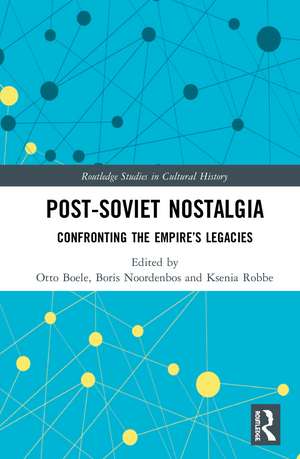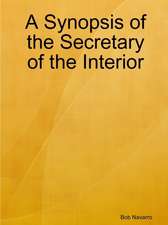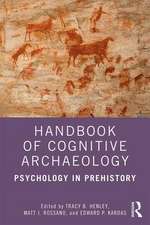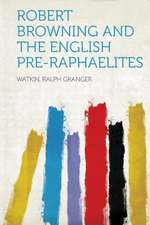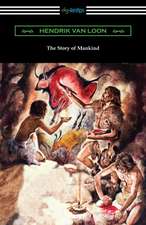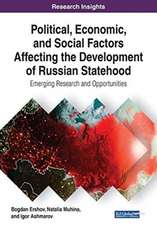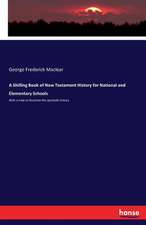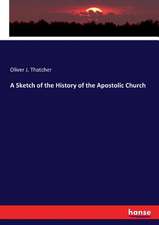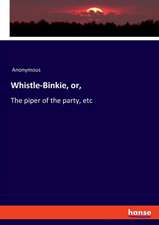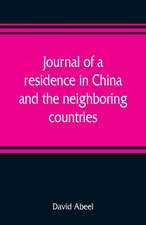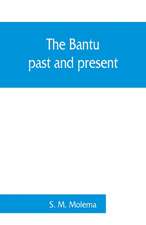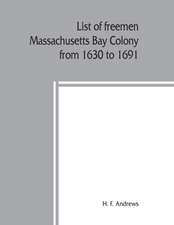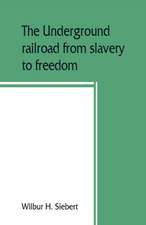Post-Soviet Nostalgia: Confronting the Empire’s Legacies: Routledge Studies in Cultural History
Editat de Otto Boele, Boris Noordenbos, Ksenia Robbeen Limba Engleză Hardback – 30 iul 2019
| Toate formatele și edițiile | Preț | Express |
|---|---|---|
| Paperback (1) | 296.50 lei 6-8 săpt. | |
| Taylor & Francis – 29 ian 2024 | 296.50 lei 6-8 săpt. | |
| Hardback (1) | 1000.27 lei 6-8 săpt. | |
| Taylor & Francis – 30 iul 2019 | 1000.27 lei 6-8 săpt. |
Din seria Routledge Studies in Cultural History
-
 Preț: 311.41 lei
Preț: 311.41 lei -
 Preț: 310.45 lei
Preț: 310.45 lei -
 Preț: 310.08 lei
Preț: 310.08 lei -
 Preț: 325.96 lei
Preț: 325.96 lei -
 Preț: 311.41 lei
Preț: 311.41 lei -
 Preț: 311.41 lei
Preț: 311.41 lei -
 Preț: 326.49 lei
Preț: 326.49 lei -
 Preț: 665.25 lei
Preț: 665.25 lei -
 Preț: 315.70 lei
Preț: 315.70 lei -
 Preț: 280.29 lei
Preț: 280.29 lei - 9%
 Preț: 934.83 lei
Preț: 934.83 lei -
 Preț: 325.15 lei
Preț: 325.15 lei -
 Preț: 313.60 lei
Preț: 313.60 lei -
 Preț: 326.78 lei
Preț: 326.78 lei - 9%
 Preț: 276.16 lei
Preț: 276.16 lei -
 Preț: 341.39 lei
Preț: 341.39 lei -
 Preț: 356.84 lei
Preț: 356.84 lei - 30%
 Preț: 848.15 lei
Preț: 848.15 lei - 5%
 Preț: 1290.15 lei
Preț: 1290.15 lei - 30%
 Preț: 849.37 lei
Preț: 849.37 lei - 25%
 Preț: 858.29 lei
Preț: 858.29 lei - 28%
 Preț: 822.34 lei
Preț: 822.34 lei -
 Preț: 438.56 lei
Preț: 438.56 lei - 28%
 Preț: 819.91 lei
Preț: 819.91 lei - 18%
 Preț: 1109.99 lei
Preț: 1109.99 lei - 18%
 Preț: 1055.06 lei
Preț: 1055.06 lei - 18%
 Preț: 1068.18 lei
Preț: 1068.18 lei - 18%
 Preț: 1058.65 lei
Preț: 1058.65 lei - 18%
 Preț: 1057.89 lei
Preț: 1057.89 lei - 18%
 Preț: 1110.74 lei
Preț: 1110.74 lei -
 Preț: 487.02 lei
Preț: 487.02 lei -
 Preț: 412.37 lei
Preț: 412.37 lei - 18%
 Preț: 1115.51 lei
Preț: 1115.51 lei -
 Preț: 489.10 lei
Preț: 489.10 lei -
 Preț: 281.63 lei
Preț: 281.63 lei - 18%
 Preț: 1057.09 lei
Preț: 1057.09 lei - 18%
 Preț: 1055.51 lei
Preț: 1055.51 lei - 28%
 Preț: 820.73 lei
Preț: 820.73 lei - 18%
 Preț: 1110.61 lei
Preț: 1110.61 lei -
 Preț: 431.57 lei
Preț: 431.57 lei - 18%
 Preț: 1054.71 lei
Preț: 1054.71 lei -
 Preț: 397.66 lei
Preț: 397.66 lei - 30%
 Preț: 932.43 lei
Preț: 932.43 lei - 18%
 Preț: 1060.19 lei
Preț: 1060.19 lei -
 Preț: 442.12 lei
Preț: 442.12 lei - 18%
 Preț: 1052.38 lei
Preț: 1052.38 lei
Preț: 1000.27 lei
Preț vechi: 1219.84 lei
-18% Nou
Puncte Express: 1500
Preț estimativ în valută:
191.40€ • 208.56$ • 161.28£
191.40€ • 208.56$ • 161.28£
Carte tipărită la comandă
Livrare economică 23 aprilie-07 mai
Preluare comenzi: 021 569.72.76
Specificații
ISBN-13: 9780367332655
ISBN-10: 0367332655
Pagini: 254
Ilustrații: 22 Halftones, black and white; 22 Illustrations, black and white
Dimensiuni: 152 x 229 x 22 mm
Greutate: 0.45 kg
Ediția:1
Editura: Taylor & Francis
Colecția Routledge
Seria Routledge Studies in Cultural History
Locul publicării:Oxford, United Kingdom
ISBN-10: 0367332655
Pagini: 254
Ilustrații: 22 Halftones, black and white; 22 Illustrations, black and white
Dimensiuni: 152 x 229 x 22 mm
Greutate: 0.45 kg
Ediția:1
Editura: Taylor & Francis
Colecția Routledge
Seria Routledge Studies in Cultural History
Locul publicării:Oxford, United Kingdom
Public țintă
Postgraduate and UndergraduateCuprins
Introduction: The Many Practices of Post-Soviet Nostalgia: Affect, Appropriation, Contestation Part I: Affect 1. Journeying to the Golden Spaces of Childhood: Nostalgic Longing in the Online Community The USSR Our Motherland Through the Visual Image of the Soviet Toy 2. Second-hand Nostalgia: On Charms and Spells of the Soviet Trukhliashechka 3. Village Voice: Peasant Nostalgia in Recent Oral History Part II: Appropriation 4. Longing for Fear and Darkness: "Oppositional Grassroots Stalinism" in the 1970s-80s and Its Influence on Legitimizing Political Elites in Today’s Russia 5. Remembering Chernobyl Through the Lens of Post-Soviet Nostalgia 6. To Be Continued: Post-Soviet Nostalgia in Sergei Miroshnichenko’s Time-Lapse Documentary Series Born in the USSR Part III: Contestation 7. Under the Sign of Nostalgia: The Cultural Revolution in Perm and Its Narrative Representations 8. Nostalgia Inside Out: Re-addressing Post-Soviet Loss in Andrei Astvatsaturov’s Novels 9. "Perestroika and the 1990s – Those Were the Best Years of My Life!" Nostalgia for the Post-Soviet Limbo. Afterword: After Nostalgia: A Backward Glance at a Backward Glance
Notă biografică
Otto Boele is Associate Professor of Russian literature at Leiden University.
Boris Noordenbos is Assistant Professor in Literary and Cultural Analysis at the University of Amsterdam.
Ksenia Robbe is Assistant Professor in African and Comparative Literature at Leiden University.
Boris Noordenbos is Assistant Professor in Literary and Cultural Analysis at the University of Amsterdam.
Ksenia Robbe is Assistant Professor in African and Comparative Literature at Leiden University.
Descriere
This collection explores post-Soviet nostalgia as a discursive practice serving a variety of agendas. The authors show how post-Soviet feelings of loss and displacement are turned into effective tools of state building, as well as into weapons for resistance and the assertion of individual autonomy.
